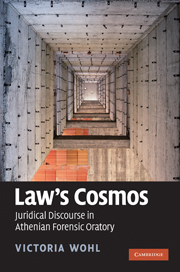Book contents
- Frontmatter
- Contents
- Preface: before the law
- Introduction: the rhetoric of law
- PART I THE BOUNDARIES OF LEGAL DISCOURSE
- 1 The world of law: oratory and authority
- 2 Legal violence and the limit of justice
- PART II THE LEGAL SUBJECT
- PART III TIME, MEMORY, REPRODUCTION: LAW'S PAST AND FUTURE
- Conclusion: the paradigmatic law
- Bibliography
- Index locorum
- General index
1 - The world of law: oratory and authority
from PART I - THE BOUNDARIES OF LEGAL DISCOURSE
Published online by Cambridge University Press: 07 September 2010
- Frontmatter
- Contents
- Preface: before the law
- Introduction: the rhetoric of law
- PART I THE BOUNDARIES OF LEGAL DISCOURSE
- 1 The world of law: oratory and authority
- 2 Legal violence and the limit of justice
- PART II THE LEGAL SUBJECT
- PART III TIME, MEMORY, REPRODUCTION: LAW'S PAST AND FUTURE
- Conclusion: the paradigmatic law
- Bibliography
- Index locorum
- General index
Summary
Once understood in the context of the narratives that give it meaning, law becomes not merely a system of rules to be observed, but a world in which we live.
Cover 1993: 96We are foreigners on the inside – but there is no outside.
De Certeau 1984: 13–14Rhetoric names the textures of relation that make external situations and contexts internal to the truth of law.
Ryan 1989: 155ON THE INSIDE
Juridical discourse constructs a world of its own, a world of law. That legal world was, of course, embedded within the broader landscape of the polis: nomos means “norm” as well as “law” in Greek, and the courts were a central arena for the reproduction and negotiation of Athens' normative values and beliefs, as much recent scholarship has shown. But if the law was enmeshed in the fabric of Athenian society and ideology, it also had a discursive specificity of its own. In the dikastēria (courts), the Athenians developed a juridical way of looking at life, social relations, the past and the future; they also reflected self-consciously on the law itself, on its discursive boundaries, its institutional force, its internal rules and regularities. This juridical mode of thought was not, needless to say, isolated or idiosyncratic; if it were, it would have been incomprehensible. Rather the law, as Steven Johnstone has argued, was a “semiautonomous field.
- Type
- Chapter
- Information
- Law's CosmosJuridical Discourse in Athenian Forensic Oratory, pp. 21 - 65Publisher: Cambridge University PressPrint publication year: 2010

